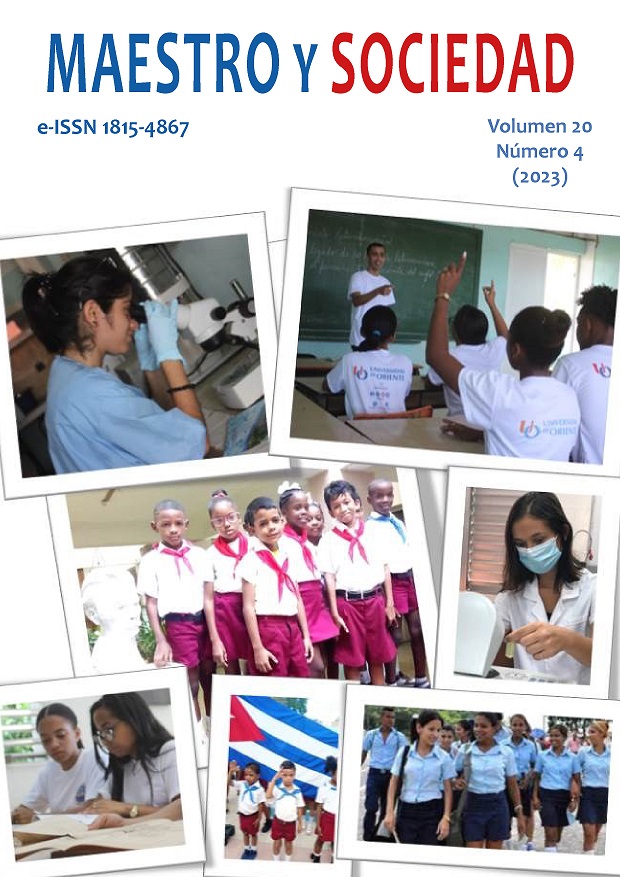Guidance for adolescents and young people from rural mountain communities in times of COVID-19
Keywords:
sociocultural training, educational orientation and adolescent groupsAbstract
The university-community connection is revealed as an aspect that is regulated by higher authorities, who recognize in
said connection a weapon of power and effectiveness to contribute to the comprehensive training of adolescents and
young people from rural mountain communities where educational guidance and influences They become essential
tools in the process of these in different communities without distinction of geographical location. This link makes
the educational work of the school, the family and the community more efficient when their actions are coherent
and systematic in order to achieve adequate sociocultural training. It is the intention of this work to reflect on some
considerations from the Research Project of the "Manuel F. Gran" Center for Pedagogical Studies of the University of
Oriente, its projects and the research networks that aim to develop an interventional diagnosis in rural communities
mountains with the use of educational guidance resources that promote awareness of the responsibility of adolescents
and young people in the pandemic period. Methods such as analysis and synthesis, system approach, observation,
survey and interview, and inventory of youth problems were used. The university, in its conception, is responsible for
playing the central role of coordinating institution of all educational and sociocultural influences and actions that allow
educational guidance for adolescents and young people in this context.
References
Aranda, B. L. (2005). Metodología para la formación sociocultural del escolar de primaria en el seminternado “Abel Santamaría Cuadrado”. [Tesis de doctorado. Instituto Superior Pedagógico “Frank País García”].
Aranda, B. L. (2017). La formación sociocultural del adolescente. Una mirada desde la perspectiva sociológica. Revista IPLAC (2140).
Aranda, B. y Heredia, M. (2019). La influencia de la comunicación en las manifestaciones socioculturales de los adolescentes de comunidades rurales. Libro Comunicación Social: Lingüística medios Masivos, Arte, Etnografía, Folclor y otras ciencias a fines. Vol. II.
Arias, H. (2002). La comunidad y su estudio. Editorial Pueblo y Educación.
Fernández, A. (2011). La orientación familiar y comunitaria. Editorial Pueblo y Educación.
Heredia, M. (2020). La orientación profesional desde el trabajo comunitario de los estudiantes de la carrera Pedagogía-Psicología. [Tesis de especialización en docencia psicopedagógica. Universidad de Oriente].
Heredia, M. (2021). La gestión educativa para la orientación profesional en adolescentes y jóvenes de comunidades rural. [Tesis de doctorado. Universidad de Oriente].
Heredia, M. (2021). Gestión educativa universitaria en la formación de adolescentes y jóvenes en comunidades rurales. Revista Maestro y Sociedad, 18(1), 51-63. http://maestroysociedad.uo.edu.cu
Mafrán, Y. (2017). Estrategia para desarrollar la orientación educativa comunitaria. [Tesis de especialización en docencia psicopedagógica. Universidad de Oriente].
Palú, A. (2020). La orientación familiar una herramienta necesaria para una adecuada comunicación con sus hijos adolescentes tempranos. [Trabajo de Diploma. Universidad de Oriente].
Palú, A. (2022). La formación ciudadana en los estudiantes de carreras pedagógicas. Revista Maestro y Sociedad, 19(4), 1789-1808. http://maestroysociedad.uo.edu.cu
Salazar, M. (2019). La preparación familiar: una alternativa para brindarles orientación profesional a sus hijos adolescentes de comunidades rurales. [Tesis de Maestría. Universidad de Oriente].
Rodríguez, A. (2022): La formación de la competencia orientadora comunitaria en el egresado de pedagogía psicología. [Tesis doctoral. Universidad de Oriente].
Published
How to Cite
Issue
Section
License
Copyright (c) 2023 Belkis Luisa Aranda Cintra, Mayelin Heredia Vega, Ainely Palú Sánchez

This work is licensed under a Creative Commons Attribution-NonCommercial-NoDerivatives 4.0 International License.
This journal provides immediate open access to its content, based on the principle that offering the public free access to research helps a greater global exchange of knowledge. Each author is responsible for the content of each of their articles.



























 Universidad de Oriente
Universidad de Oriente 